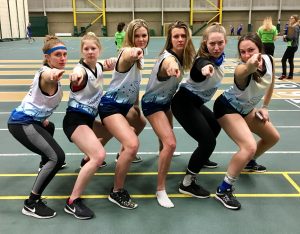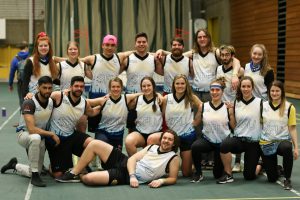By: Hannah Davis
The Kinesiology Games (Kin Games) is an annual kinesiology conference which brings university students together for three days to meet new friends, network, learn, compete, and promote their respective schools’ kinesiology programs. Universities from across Canada send teams composed of students to participate in the games and proudly represent their schools. This year, the University of Alberta was the Kin Games’ gracious host, meaning us West Coast kids got to experience Edmonton’s prairie cold. There were 32 teams from universities across the country who entered the games, and Simon Fraser University was one of them.
I can proudly say that SFU REPRESENTED at Kin Games. The team brought home first in the dance category, second in the spirit category, and third place overall, meaning our university was elite amongst 31 competing schools. The trophies and past jerseys are displayed in the kinesiology wing, by the Kinesiology General Office, so anyone can go and have a look at them. While it is incredibly significant that the team could proudly take home three wins, it becomes even more significant when considering this team’s origins. The team has progressed immensely since its humble beginning five years ago. While talking to Erin Williams, one of the captains of this year’s team, she said that it was initially challenging to build a substantial team each year that could consistently attend the event, and now look at us! We have become a true contender at the Kin Games.

This was my first year participating in the Kin Games, and people were right when they told me that the experience would surpass any expectations I had. Upon arriving in Edmonton, I immediately felt welcome and included at the event. The team of dedicated volunteers and staff who ushered me in on the first day were friendly and inviting, and acted as an indication of what the rest of the conference would be like. There was something really amazing and almost indescribable about the way in which the event seems to foster an intense sense of community, or more accurately, KINmmunity. To exemplify this, some taglines of the weekend were: “you’re a beauty,” “you’re all tens,” and my favourite, “we are all best friends.” Sometimes entire groups of people would break out chanting the latter, which felt entirely reminiscent of summer camp, but better and with less mosquitos. Team members also traded gear; hoodies, T-shirts, rubber wristbands, hats, and any other variation of their school’s swag, a practice which further emphasizes the conference’s ever-present promotion of community.

Each school also prepared a dance to perform, and were scored based on a number of components including creativity, technique/execution, difficulty, and presentation quality. SFU’s awesome choreographer, Katriana Wong, included waaking and krump into the team’s choreography. To get an understanding of what this means, check out the dance video here.
The spirit category included a wide range of challenges, from donating to a charity (SFU’s Kin Games team donated clothing and other items to the Developmental Disabilities Association), to making up chants, to taking photos with bears at the University of Alberta campus, to overall being a positive and encouraging group of people while participating in all conference events. Academics consisted of each team attending a variety of lectures, then having the team collectively tested on their knowledge at checkpoints during a 2.5 km run/race. Never have I felt so much pressure to pay attention during lecture.
The SFU team held weekly practices to rehearse and learn the dance, as well as go over sports rules and discuss spirit challenges. While the primary function of these weekly meetings was evidently to prepare for Kin Games, they also acted as an outlet and distraction from the inherent stresses of being a university student. Erin Williams, one of the captains and veterans of this year’s team, exemplified this idea in sharing that “it’s really easy to get consumed in school stress, especially in upper-division courses, and Kin Games has always been a way for me to get away from that once a week. It’s shown me how important it is to find balance, and also introduced me to some great people to look up to along the way.”

Overall, the support each person had for each other, for their team, and for teams from other universities was staggering. As one who may not always step out of her shell upon meeting new groups of people, I felt included and encouraged at all times. I feel so happy and lucky to have had the opportunity to participate in the event, and to have been able to get to know such an incredible group of people. Kin Games veteran Konrad Maludzinski said, “Kin Games has made my university experience more fun and meaningful than I could ever imagine,” which emphasizes the profound effect the conference has on individuals. While both rookies and vets of the team have their own particular experiences of the Kin Games, the heart of what each person communicates seems to remain similar: the love, support, and feeling of community is real at Kin Games.





